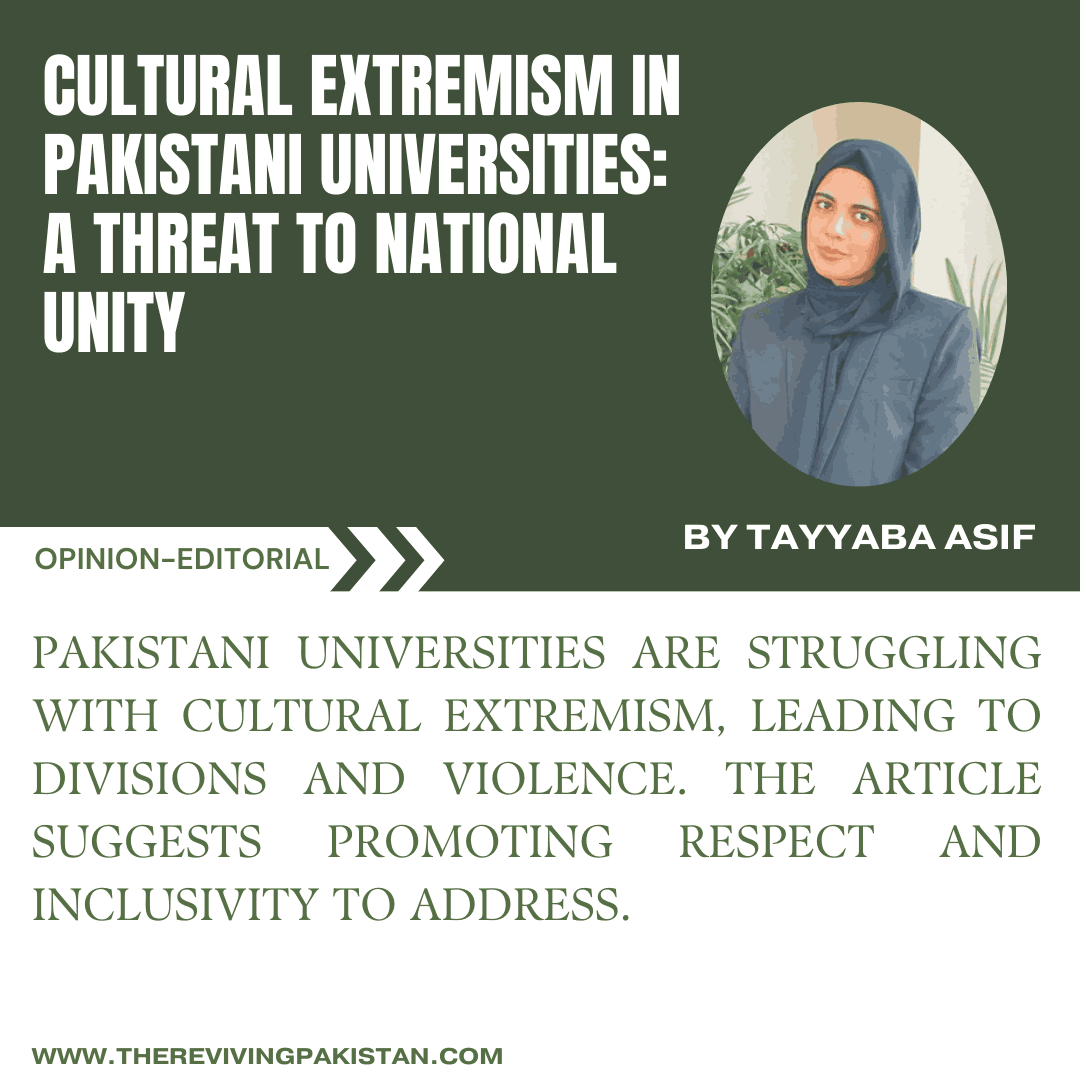About the Author(s)

Tayyaba Asif
Author is a law student passionate about writing and speaking on social issues, driven by a desire to create positive change, particularly in the area of human rights.
Pakistan is a country with a rich culture and is home to a multitude of ethnic groups. Major ethnic groups include Punjabis, Sindhis, Pashtuns, Balochs and Mohajirs, along with other groups. The history of these groups dates back thousands of years, with each group maintaining its own unique way of life, traditions, and culture. There is no doubt that different cultures are important But what happens when culture and nationality become opponents? What happens when people belonging to distinct groups start to consider culture as their sole identity and start despising other groups? How is the extremism in Pakistani culture destroying the love of being Pakistani?
This article will explain how, in different institutes, more specifically in universities, extremism for culture and distinct groups have been creating fights and issues that will be dangerous in the future.
Cultural extremism can take many different forms, such as the repression of minority voices or the imposition of strict beliefs. It creates an atmosphere of intolerance where different viewpoints are suppressed, and diversity is viewed as dangerous. This fosters an aggressive and violent culture. Due to the rise of cultural extremism at Pakistani Universities, there are now divisions that not only threaten academic freedom but also support an aggressive and violent culture. Students are forced into constrictive, sectarian mind-sets that value cultural loyalty over national identification, rather than seeing their diversity as a source of strength.
No one can deny that being from a different province or group is something that makes you distinguished; this is an obvious thing that people from different groups have an affinity with their culture, their ethnicity. They want to promote their culture, language, and customs. Everyone feels pride in discussing their culture. It is totally normal to feel more close to your own group, but behaving completely differently just because someone is not from the same group is bizarre.
Before discussing the reasons for this extremism, let’s discuss some of the cases of sufferers I came across:
- “Being a Sindhi, studying in Islamabad has become a nightmare for me. I have always been treated like an alien; my accent was different, and my classmates used to make fun of me. Making fun of my culture was something that was very normal for them. I tried my best to socialize with them, but they believe I do not match their standards. And that’s the reason why I now hang out only with Sindhis. We have our own group now. And honestly, our hatred for other groups, especially Punjabis, has increased drastically.”
- “Being from Baluchistan, they treat me like an alien. Always giving me remarks about BLN. And that I am a spy.”
- “As a Balochi, I’ve faced discrimination and ridicule in university settings. My identity has been used against me.”
- According to a professor of a well-reputed university, ‘There are different groups representing their provinces in the university. I have seen students hang out only with those of the same ethnicity. They have hatred for other groups. And by hatred, I actually mean they despise each other.’”
These are just a few examples. Provincial bias has increased a lot. Now, to discuss some headlines I came across during my research:
Five injured at Punjab University as IJT halts cultural event.
Panic at Urdu university campus as student groups clash
So, what’s the reason for all this hatred among students? Why has the unity of being from the same nation lost its significance? There are many reasons, which one can list, but let’s talk about the major ones. The main reason is our government. The responsibility of the government is to ensure that every citizen of the state has equal rights and opportunities. Articles 8–28 of the Constitution talk about the rights of Pakistani citizens. So, what went wrong? The answer is the injustices that the government has done since independence. Ignoring the development in provinces like Sindh and Baluchistan. Many areas in these provinces are neglected. People are deprived of essential needs like food, water, protection, and fundamental rights.
Aside from that, one of the major issues is the internet, not just the media, false reporting, but by posting insensitive things about each other in the name of fun. So-called “memes” targeting people from other provinces also fuel hatred.
There are many multi-ethnic countries around the world, but their situations differ greatly. The reason is that they focus on learning, growth, and education, without obsessing over other things. Their governments strive to provide equal opportunities, which fosters a culture of respect among citizens. In contrast, Pakistan’s situation is opposite. When provinces are treated unfairly and injustices prevail, it’s challenging for people to respect other provinces. Moreover, when individuals are labelled as terrorists and despised based on their province, acceptance and respect become even more difficult.
University life should be about mutual respect and learning from one another, rather than ridiculing and fighting. To achieve success, we must acknowledge that we are not superior to others, and that having a different accent or belonging to a different group is not a reason for hatred. Additionally, the government should work towards development and progress in all provinces, as this is the key to unity and prosperity.

